Case study - educe
Established in 1997, Sociedad Cooperativa de Responsabilidad Limitada (EDUCE) is a co-operative dedicated to the production and export of Fairtrade honey. Today, EDUCE represents the voices and interests of 800 beekeepers in 40 co-operatives, across three states of the Yucatán Peninsula of Mexico. This area is known for its production of high-quality honey, particularly from the Melipona bee, which is native to the region. These bees are stingless and are known for their unique honey, which is prized for its medicinal properties and distinct flavour.
For Mayan communities, bees and honey have always been sacred. The honey produced in the region is harvested using traditional methods, which involve using small wooden boxes called “cajas” to house the bees and collect the honey. The cajas are placed in areas with abundant flowering plants, and the bees are left to forage and produce honey at their own pace. Once the honey is ready it is extracted using simple tools and techniques with minimal disruption to the bees and their habitat.
EDUCE General Manager Miguel Ángel Munguìa (pictured right) states that for each kilo of honey marketed as Fairtrade, an additional 20 cents are paid to the farmer through the Fairtrade Premium. This represents 1.50 to 2 pesos per kilo of honey, the equivalent of 0.07p to 0.09p.
For many producers in the region, beekeeping is one of the main sources of economic income. Other activities such as cornfields and family gardens are present; however, they exist for subsistence. One of the key challenges that beekeepers face is the commercialisation of honey at low prices, combined with the impacts of climate change.
In Mexico, there are 40 UNESCO World Network Biosphere Reserves, which function as long-term refuges for biodiversity. According to the United Nations, climate change is playing an increasingly important role in the decline of biodiversity around the world. Specifically in beekeeping, alterations in rainfall patterns and drought events, interspersed with an increased frequency of natural phenomena such as hurricanes and storms, represent a destabilising factor for beekeeping because flowering periods are becoming increasingly unpredictable.
This unpredictability makes it increasingly difficult for beekeepers to harvest the same amount of honey each year, as they must coordinate and anticipate the flowering time to ensure that hives are ready for honey harvesting. This poses a serious challenge to the farmers, who are threatened with losing a significant portion of their income.
EDUCE first became a Shared Interest customer in 2002 when they received a loan to prefinance honey orders; they held this first facility until 2005. In 2015, we re-established contact with EDUCE and in 2016 they became a customer for the second time, receiving loans to prefinance their honey harvest. EDUCE currently utilise the finance from Shared Interest to build stocks of honey and to prefinance honey contracts.
Since working with Shared Interest the number of producer groups has increased from 63 to 113. EDUCE General Manger Miguel, explained the size of these groups ranges from 10 members to 140 members. He said: “Financing (from Shared Interest) has been key to increasing volume and growing.”
Speaking about the benefits of the Shared Interest loan, Commercial Manager Leonor López Garduza (pictured below-left) said:
“The money allows the beekeepers to continue with their work, maintain their families and be productive members of society. Without that money, the producers would be at the mercy of other traders who are less ethical.”
Plant Manager Juan Carlos Munguía (pictured below-right) said:
“The investors can be sure that for the last 25 years EDUCE has been working in the Maya communities, meaning the very rural, very isolated traditional communities to support a better standard of living for them. It enables them to conserve their communities and the environment and the earth, and always to benefit them.
"I would say it is a link in the supply chain, it strengthens and benefits the groups and the producers and their development. It is consolidating and keeping together families and communities and giving them options for living. It helps to avoid them having to fall into worse things like drugs trade or other things so as to make sure that they have good options. So those communities, small communities don't lose their essence as indigenous or Mayan people.”
By offering beekeepers a higher price for their product, they are incentivised to join EDUCE. Juan continued: “In the time EDUCE has been formed, it has narrowed the space between the beekeepers, the producers and the clients. So the price we can get is as good as it can possibly be because there are no intermediaries. And then at the end of the year, we have a profit, a leftover amount that we can pass on to the beekeepers.”

Maria Colli
María Colli has been an organic beekeeper for four years. She lives in Izamal in the region of Yucatán, Mexico. Maria said: “The motivation why I was interested in joining with EDUCE was the price. It's a good price for us. And the other thing is that they give us workshops, they run workshops for us on gender and on the environment…This is very small town village and with a fair bit of machoism, and so these workshops they've opened our eyes perhaps. It's a pleasure for myself and the other women to have them. We used to be embarrassed to voice opinions or to speak up or we were shy but not anymore.
“EDUCE have shown us how to diversify our products, make other uses of our products and more than anything, it's given an opportunity as women specifically, before you didn't see any, there was no such thing as a woman beekeeper. But now there's myself and my group, we've been the first and there's another group forming as well.”
Read the Case Study in Full
If you want to learn more about our 2023 longitudinal case study featuring EDUCE, please click here.
Back to Menu
